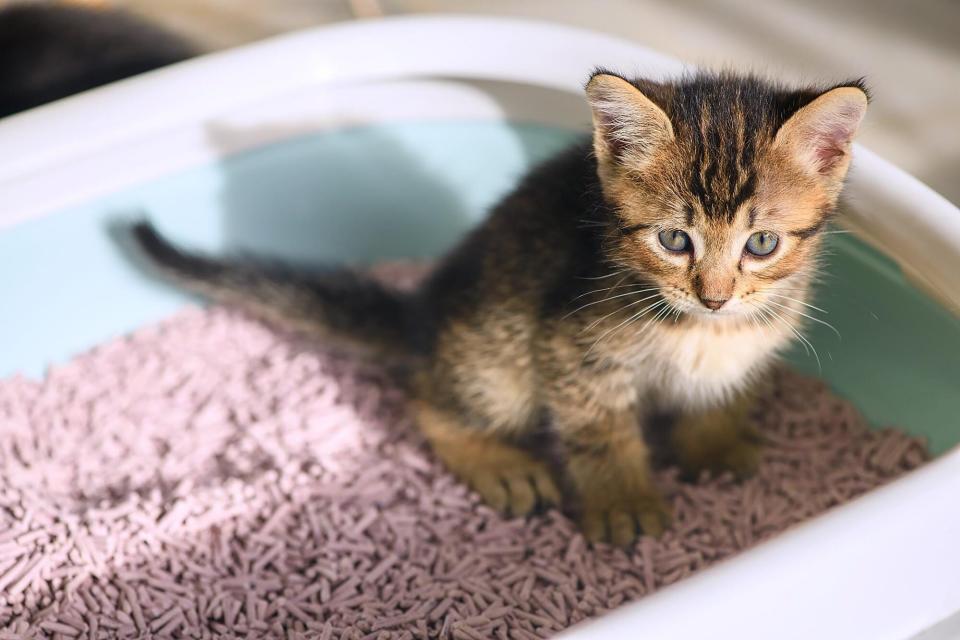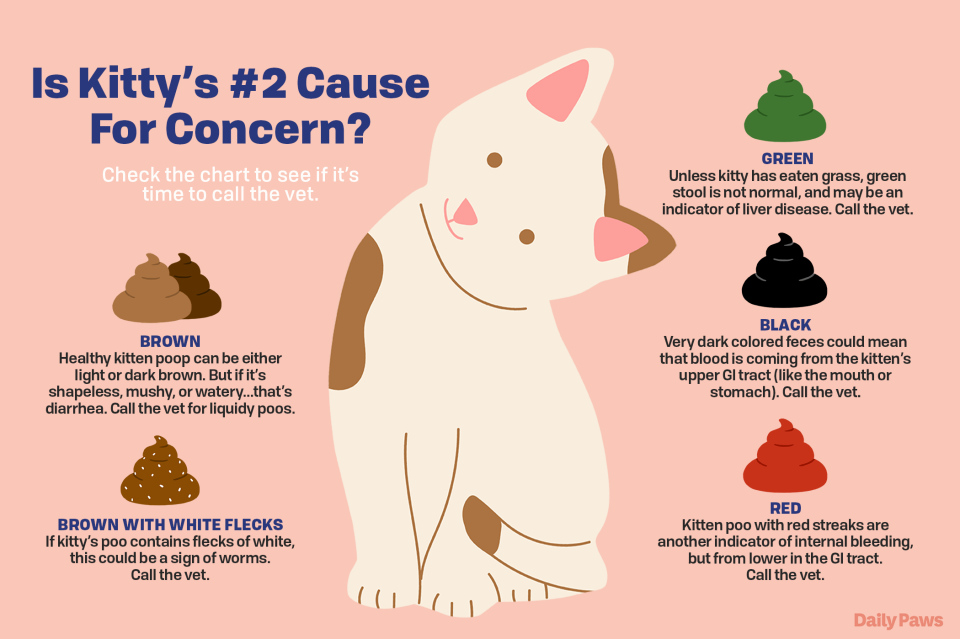Why Your Kitten Has Diarrhea and When to See the Vet
Does your kitten have diarrhea? Ugh, every pet parent knows how uncomfortable (and messy!) the runs can be. Although an occasional bout of diarrhea seems like no big deal, in kittens it can signal a real problem. Read on to find out what causes kitten diarrhea and when to head to the vet.
Causes of Kitten Diarrhea
Although people often think that a change in food can cause diarrhea in cats, that's not usually the case, says Lauren Demos, BVMS, Hons, DABVP (Feline), chief veterinary officer for Pettable and Top Vets Talk Pets correspondent.
"When cats are out in the wild they eat all kinds of things. They're eating birds, snakes, rabbits, and digesting feathers, bones, and entrails. The gastrointestinal (GI) tract is good at dealing with whatever gets thrown at it," Demos explains. "In my experience, only about 5 percent of the time would I expect any sort of GI upset from something a cat ate."

Jordan Lye / Getty
Cow's milk is the exception. People often give their kittens a bowl of milk, thinking they'll enjoy it and it'll be good for them. The problem? According to BluePearl Specialty and Emergency Pet Hospitals, kittens can't digest cow's milk (though they'll definitely lap it up). The result: A cat with diarrhea.
Besides cow's milk, these are the likeliest causes of kitten diarrhea:
Intestinal parasites and worms
Bacterial infection
Viral infection
Malformed colon and rectum
One particularly nasty virus that commonly causes diarrhea in kittens is panleukopenia (feline distemper), Demos says. Like parvovirus in puppies, it causes severe GI symptoms like diarrhea and vomiting and can be deadly.
Feline distemper often affects kittens three to five months old. Because it's widespread in the environment, nearly every cat is exposed to this virus at some point, reports the American Veterinary Medical Association.
Recognize the Signs and Symptoms of Diarrhea in Kittens
You should know that it's normal for kittens to have softer poop, Demos says. A kitten's stools are not quite as dry and hard as an adult cat's. But if your kitten's poop is consistently shapeless and mushy or is liquidy, then it's diarrhea.
Kittens with diarrhea may have accidents outside the litterbox. You may also notice diarrhea on their paws or around their tail (clean-up on aisle 5, please!).
Kitten Poop Color: What's Normal and What's Not?

Julia Bohan
The color of a kitten's poop can change depending on her diet. Anything that's light brown to dark brown is normal, Demos says. However, poop that's red, black, or green is concerning.
Also, blood in your kitten's stool is definitely a sign something is wrong. Contact your veterinarian if the color of your cat's stool is off or you see blood.
When to See a Veterinarian
Kitten diarrhea can indicate a more serious condition, especially when paired with other symptoms such as:
Vomiting
Sluggishness
Loss of appetite
Poop that's red, black, or green
Poop with white flecks or streaks
Blood in stool
Any changes in behavior
If your kitten has diarrhea and additional symptoms, seek immediate veterinary care. "Kittens don't have bodily reserves to handle physical stressors and can rapidly decline," warns Demos.
However, if your kitten has diarrhea but is acting normally, you can wait a day or two before contacting your vet. If the diarrhea continues, visit your veterinarian. Days of diarrhea can lead to dangerous dehydration in kittens.
Kitten Diarrhea Treatment
You might be tempted to help your kitten get back on track by feeding her pumpkin puree or a bland diet. But Demos says these home remedies don't work with cats.
What is helpful is providing your veterinarian with information. Take photos of the kitten diarrhea or even collect a stool sample. You can drop it off to be tested at your veterinary clinic. Stool tests look for intestinal parasites and worms, a common cause of kitten diarrhea.
Depending on the diagnosis, treatment may include medications to kill parasites or fight bacterial infections. Sometimes vets recommend trying cat-specific probiotics (good bacteria that help with digestion) for a day or two to see if it'll fix the problem, says Demos.
How to Prevent Kitten Diarrhea
Parasites are often the cause of kitten diarrhea. That's why, Demos says, kittens should have a minimum of two to three deworming treatments. These medications are routinely used to safely rid kittens of intestinal worms like tapeworm, roundworm, and hookworm. Ongoing parasite-control medications that prevent fleas and heartworms can also help protect against intestinal parasites.
Another way to keep your kitten healthy is by following the recommended vaccination schedule. Some of the vaccines protect against diarrhea-causing and life-threatening viruses like feline distemper.
Getting regular veterinary care and keeping a close eye on your fur baby are the best ways to ensure your kitty stays safe.

